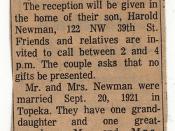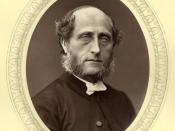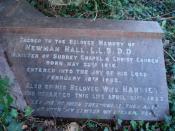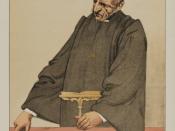Controlling Destiny In America, a citizen expects a storybook life. A life which has a controlled destiny is ideal. The American dream is based on making enough money to own a house and finding a mate. Money becomes the main part of the dream, and is expected to make the dream become a reality. Europe, however, is quite different. Europe is not about capitalism; it is about the family one belongs to and how much money that family is worth. Life is controlled and destiny is easily predictable. Naturally, the two cultures collide. In The American, by Henry James, the lead character Christopher Newman feels that he can travel to Europe, find the girl of his dreams, and marry without a problem. Unfortunately, one family has a problem with his goals. The Bellegarde's are the supreme example of "old money," and a dynasty that is not going to allow "new money" into it, no matter how hard Newman tries.
A person cannot control his own destiny and he has to find a compromise between his freewill and destiny in order to accept his future. The novel shows this through Christopher Newman throughout the entire story.
In the beginning of the novel, Christopher Newman thinks that the world is in his hands and that with his money he is there to enjoy it. He goes to Europe thinking that Europe will welcome and admire his wealth, and he is not set astray by the rich culture and heritage of Europe. James introduces the novel with a description of Newman walking through the infamous Louvre in Paris, "It was a typical vagueness which is not vacuity, that blankness which is not simplicity, that look of being committed to nothing in particular, of standing in an attitude of general hospitality to the chances characteristic of many American faces" (James 20). Newman represents the typical American, and turns his back on all material things so that he is enriched in what he is experiencing at the moment. He sees himself as a free person standing in a world which seems to be working with him. (Banta 154) Newman's life had always been based on the material things, and now he was ready for something new. As Newman is reflecting with Mr. Tristam over the use of money and how it affects a person, James describes how Newman feels about his financial situation in life: "Life for him and been an open game, and he had played for high stakes. He had won at last and carried off his winnings; and now what was he to do with them?" (James 36) Newman had already completed his life and now he was ready for something new. However, he feels that with his money anything is possible and that he can control getting what he wants. He puts a price on getting what he wants in life and believes he can but his own happiness. (Rowe 89) With money, anything is possible to Newman, and so he controls his destiny. This leads to Newman's assumption that money combined with Mademoiselle Noemie will bring him into European culture.
With Mademoiselle Noemie, Christopher Newman believes that he desires a part of the European culture, and obtains this through buying poor remakes of pieces in the Louvre and free voice lessons. He wants to feel free from the capitalist world but still uses his financial strength to his advantage. Christopher Newman is reviewing his decision to buy the painting that he bought from Mademoiselle Noemie when James writes, "It was only 20 minutes before that he had bought the first picture of his life, and now he was already thinking of art-patronage a fascinating pursuit." (James 29) Newman's desperate attempt to engage himself in the European culture shows that he thinks buying the art makes him automatically in it. (Mitchell 5) He thinks that he can buy his way into the culture. Newman feel that he did the right thing by purchasing art and learning some of the French language: "I don't know how much French our friend learned; but, as he himself said, if the attempt did him no good, it could at any rate do him no harm." (James 60) Newman thinks that buy learning the language of the culture that he is engrossed in he can become a part of it. (Anderson 43) The learning process is just an amusement to him, and he believes this places him in the culture. Thus, Newman now believes that since he is a part of the culture, attaining the woman of his dreams, Claire de Cintre, is possible despite their different culture.
Christopher Newman creates an ideal Claire to fit his needs and fails to realize that Claire is not this person. He ignores the fact that Claire has a different culture than him and instead decides to pursue her. Claire has become the woman of his dreams, and it is hard for him to think of her otherwise. When Newman first meets Claire, he is described as thinking: Here and there Madame de Cintre's utterance had a faint shade of strangeness, but at the end of ten minutes Newman found himself waiting for these soft roughnesses. He enjoyed them and marveled to see that gross thing, error, brought down to a fine point. (James 90) Even though she is not exactly the ideal type, Newman convinces himself that she is. Newman believes that the mind is something that holds objects, instead of feelings. He thinks Claire can be bought, and makes her the ideal wife. He can't see that his culture differs from Claire's, and so his mind is able to hold these ideas. Newman believes that with the life he has created and his ideal wife, he can understand the Bellgardes. (Hobbs, 121) Newman made Claire who he wanted her to be. He was creating his own destiny instead of letting his life takes its course. Newman tries to see what he finds so intriguing of Claire: "It was not that she was reserved; on the contrary, she was as frank as flowing water. But he was sure she had the qualities which she herself did not suspect." (James 109) Newman is not sure what it is that he finds so wonderful about Claire but he is sure she is right for him. He doesn't understand her, and instead of trying to, he allows himself to get caught up in the life that she lives. In the end, he is cheated of her and his exploration. (Bowden 32) Thus, Newman is trying to make his life happen for him. When Newman propose to Claire, he begins to find that he contains a slight naivete about the Bellegarde and their culture.
Newman's naivete about his proposal to Claire shows now that he cannot simply find something he wants and obtain it quickly. He has to work at making himself a part of the Bellegarde family. Unfortunately, Newman expects to easily jump into family that contains a life full of secrets and treachery. He doesn't understand them, but still carries on with them as if he does. At the family get together in which Newman is introduced to the Bellegarde family, Newman finally sense that something may be wrong in his quest for Claire: At last, as he turned away from the battery of smiles and other amnemities, Newman caught the eye of the marquis looking at him heavily; and thereupon, for a single instant, he checked himself. 'Am I behaving like a d---d fool?' he asked himself. (James 212) Newman never sees that his marriage to Claire isn't pure; it is a political act. He felt the party was arranged so he could become comfortable part of the Bellegarde life. He thinks that the family's rudeness towards him is because of their snobbery, not because they honestly don't want Claire to be a part of his life. (Banta 84) Newman also fails to realize that Claire is part of the Bellegarde family, and therefore must obey their rules. During a family party Newman allows his ignorance to hide the fact that there is a chance he will not be allowed into the Bellegarde family: He looked at Madame de Cintre, but she was not looking at him. If his personal self-consciousness had been of a nature to make him constantly refer to her, as the critic before whom, in company, he played his part, he might have found it a flattering proof of her confidence that he never caught her eyes resting upon him. (James 206) Newman uses his ignorance as an excuse for why things aren't going his way. In creating "Claire," Newman makes he ignorant and innocent too. He never sees himself in the people he meets or creates. (Banta 92) Newman's innocence gets in the way of his controlling his own destiny.
Newman realizes that Claire was not something he could make come into his life and that it was not his destiny. After Valentin dies, and Claire runs off to the convent, Newman is faced with realizing that some things happen in life and there is no way to change them. As Tom tries to cheer Newman up after the loss of his love, James writes of Newman's feelings: "He could cease to think of them only when he ceased to think of his loss a privation, and the days he as yet but scantily lightened the weight of this incommodity." (James 327) Newman realizes that his optimism earlier in the story may have been overrated. It was irrelevant to him now, because he is realizing that there was never anyway that he could have ever been received into a superficial and evil family such as the Bellegardes. (Goody 11) When Newman thinks of getting revenge on the Bellegardes, he realizes this too would have been a waste of his time. When he goes to the duchesses house he plans to take our his first state of revenge. Instead, he leaves the duchesses house in a state of confusion and wonderment: He seemed morally to have turned a sort of somersault, and to find things looking different in consequence. He felt a sudden stiffening of his will and quickening of his reserve. What in the world had he been thinking when he fancies the duchess could help him, and that would conduce to his comfort to make her think ill of the Bellegardes? What did her opinion matter to him? (James 325) His decision to leave the duchesses house without revealing the family secret shows that he was finished with the Bellegardes. He realized that he was never destined to be with Claire, and that she was always out of his reach. (Hobbs 124) Thus, Newman has realized that his destiny is not controlled by him, which also leads to the realization that his money also can't help him and there is hope for his future.
Newman realizes that his money cannot control the circumstances of his life, but he can have hope for his destiny. Newman, however, feels that he has no freewill also. He thinks that he has little control, but that his destiny is planned out by another source other than himself. At the end of the novel, as Newman contemplates his situation now that the Bellegardes are diminished from his life, he realizes that they have become a part of his destiny: Sometimes he began to fear that there was something the matter with his head; that his brain, perhaps, had softened, and that the end of his strong activities had come. This less loafer, useful to no one and detestable to himself-this was what the treachery of the Bellegardes had made of him. (James 338) Newman knows that his situation with the Bellegardes was destined to happen, and that his money could not have helped him control it. (Goody 16) Newman rids himself of the Bellegardes for good when he rids himself of their terrible secret. When Newman goes to visit Mrs. Tristam he throws the letter that contained the secret of the Bellegarde family into the fire: I mean never to mention the name of those people again, and I don't want to hear anything more about them.' And then he took out his pocketbook and drew forth a scrap of paper...And he tossed it into the fire. (James 342) By burning the paper, he is burning the Bellegardes from his mind. Burning the manuscript represents how Newman no longer believes he can control his destiny. His mind has changed from being commercial to emotional. He now possesses the power to see the feeling in people instead of the price he can put on them to create his ideal. (Hobbs 124) Newman has now realized that he cannot create all his life; some of it will be created for him.
Finally, Christopher Newman shows that even he cannot create a future for himself, he can only help. There is a limit to how one creates his destiny. Newman thinks he can win the Bellegardes over with his money and everything in his life will be controlled. When Claire is denied to him, he realizes that he isn't in control of his life. He accepts his fate, and moves on. When someone is able to confront his limited control of destiny, then he can see the realism in his life. Christopher Newman does this in The American. He tries to create a destiny for himself, and in the end realizes that he wasn't realistic. Newman finds that his destiny cannot be controlled, and then finds the compromise between his freewill and destiny in order to accept his future. If destiny is not controlled, the best things will happen in life.





